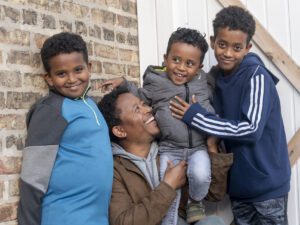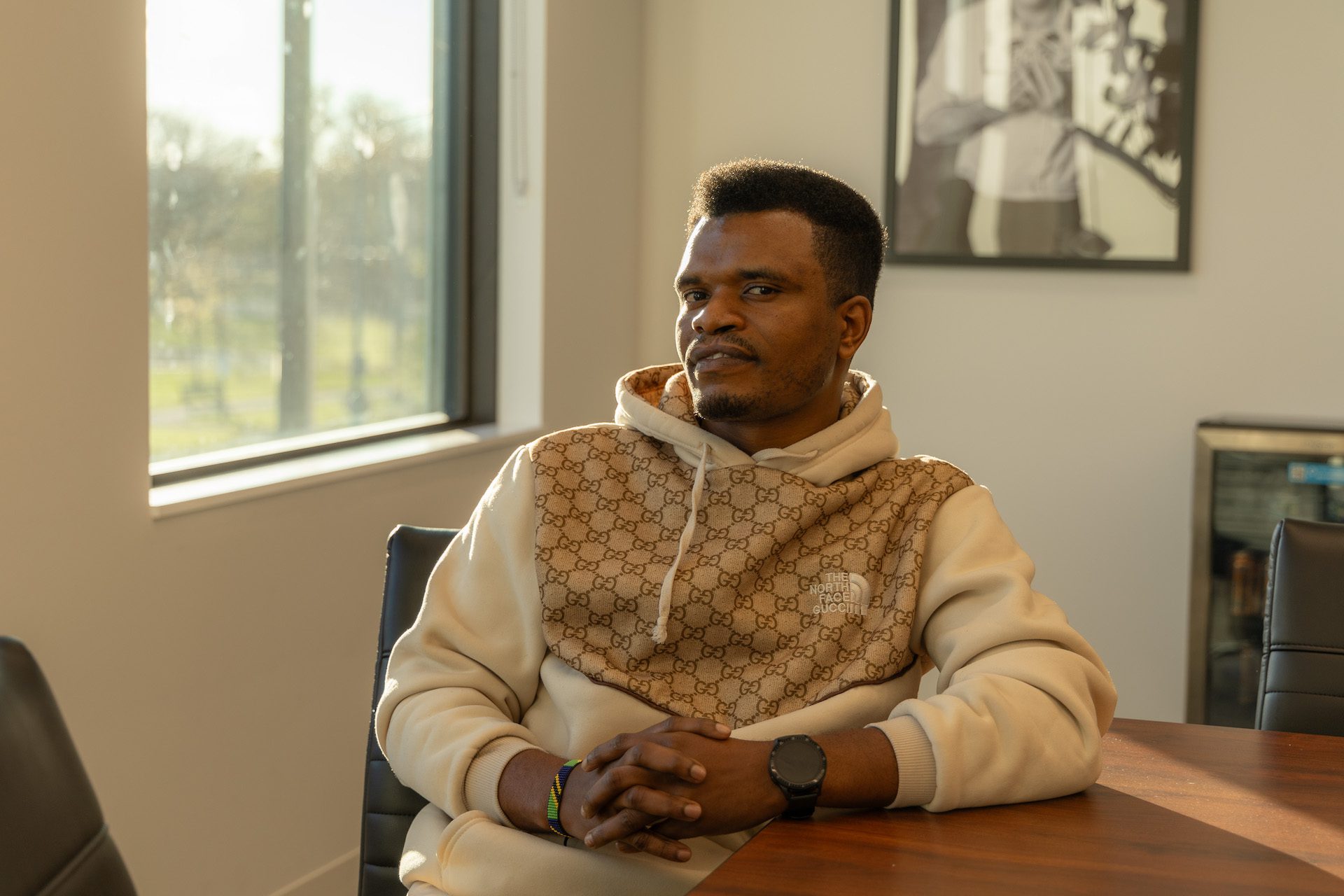 Oscar Gomez/Borderless Magazine
Oscar Gomez/Borderless MagazineDavid spent most of his childhood in a Zimbabwe refugee camp before resettling in the United States. He now helps refugees start a new life in Chicago.
When David was five, his family fled to Zimbabwe to escape persecution and a civil war in Rwanda.
He grew up in a Zimbabwe refugee camp, where he watched other families come and go. After arriving in 2003, his family waited 20 years before reaching the United States.
Looking back at his time as a refugee in Zimbabwe, he has fond memories of playing with other kids and learning each others’ languages. However, he also remembers the camp becoming a place where many young people lost ambitions. It sparked a desire in him to support refugees like him. He studied social work and co-founded an environmental justice organization to educate and mobilize refugee youth in Zimbabwe.
News that puts power under the spotlight and communities at the center.
Sign up for our free newsletter and get updates twice a week.
In 2023, David came to Chicago and was resettled with the support of RefugeeOne, a nonprofit organization that helped his family find housing, clothing and educational opportunities. Almost two years later, he now works at RefugeeOne as a community support specialist, helping other newly arrived refugees – a full-circle experience.
Borderless Magazine spoke to David about his time growing up in Zimbabwe, coming to Chicago and his work supporting refugee communities.
A Three-Day Journey
I’m from Zimbabwe. I don’t even know what Rwanda looks like. I left Rwanda when I was very young, so Zimbabwe is the only place I can really talk about.
In a refugee camp, you meet different people and make friends. They talk about their journey from their country. One person will tell others about their journey to get to Zimbabwe.
I heard those conversations at the Tongogara Refugee Camp in Zimbabwe after arriving when I was five. The time came to ask my parents: “How did we make it from Rwanda to Zimbabwe?”
In a big truck, they said.
They paid a truck driver to take us from Rwanda to Tanzania, from Tanzania to Zambia and from Zambia to Zimbabwe — about a three-day journey.
We got there as a family: my dad, mother, grandma and two siblings.
We arrived at a transit center in the capital, Harare, where our officials processed our immigration documents before we were driven eight hours to the refugee camp. While they continued to process our documents, we were placed in temporary housing. That’s where other refugees, especially the Rwandan community, welcomed us.
As a kid, I developed friendships very quickly. The kids were very social. It was funny that we would use hand gestures because we couldn’t understand each other’s languages.
I didn’t know any language when I got there, but I started picking up several languages as I mingled with people from 12 countries at the camp. We mainly spoke Shona and English at the camp.
Two weeks after arriving, I started going to a nearby school, which was a three-kilometer walk away. There, I made more friends, practiced yoga and became a captain of the gymnastics club.
My parents made me take classes in Kinyarwanda, my mother language. I only knew a few words because I had only gone to school in Zimbabwe for a short time.
Read More of Our Coverage
Growing Up In A Refugee Camp
The camp was like my first home. It was in the middle of the forest, which was hard because it would get really hot, but I thought it was the best. The first few years at camp felt like a free city to me as a kid because everything was provided, like food, clothes, monthly allowances and even a portion of land on a farm to grow our crops.
It was fun for us kids. We played soccer and volleyball, played hide-and-seek, put on gymnastics shows for money and dipped into small rivers nearby.
Around 2008, when I was in middle school, living in the camp became more difficult. As more refugees arrived, resources became more limited. The number of refugees increased from when I first arrived and when I ultimately left.
That’s when resources started diminishing. Allowances and food were reduced and electricity was shut off in refugee homes. This meant you couldn’t use a fan or read at night; you could only read during the day. This affected everyone, especially me, because I love learning.
At the time, I started noticing some kids would walk to school barefoot. Some stopped going altogether.
I saw people drop out of school because they saw others at the camp unable to find jobs after graduating with a college degree. I saw people become hopeless and turn to drug abuse and prostitution. It became especially bad during COVID-19. There were a lot of unwanted pregnancies and abortions, even deaths of little girls who were pregnant and died during the delivery.
For high school, I went to a boarding school. There, I saw some kids drop out because they couldn’t afford it. Scholarships were available to cover the costs, but the spots were limited, so many were left behind. My parents cut forest trees, made charcoal and sold it to cover my sister’s and my schooling until I got a scholarship to cover my last two years. They knew I’d get a good education at the boarding school.
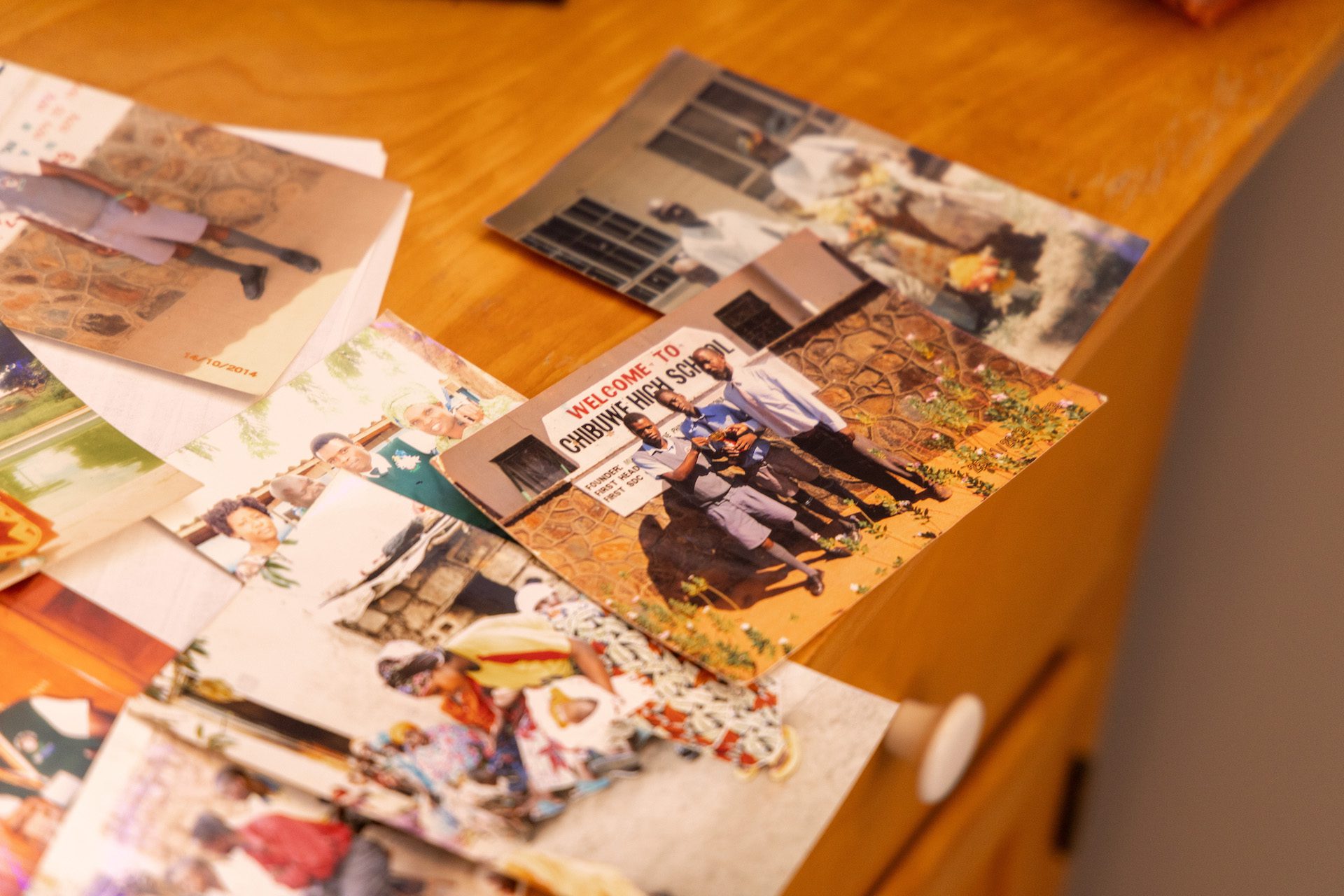
Going to boarding school was hard for my parents because I wasn’t in the camp anymore, so I’d only see them for two weeks over three months. I also started losing my Kinyarwanda because I didn’t spend time with my parents. I just spoke in other languages.
Teaching Young People About Climate Change
I received a scholarship to attend Women’s University in Africa in Harare. It covered everything. They even gave me a laptop and pocket money to cover school materials and living expenses. It was really nice.
I chose to study social work with a focus on post-traumatic stress disorder. It was hard for me to see young people at the camp, especially unaccompanied minors, small children and orphans, lose hope for their future. During college, I worked at Childline, an organization focused on the protection of children from abuse, including refugee children.
My passion for protecting and guiding the youth led me to help co-found an organization called Refugee Coalition for Climate Action, or RCCA, with nine other refugees in 2022. We cleaned the camp, mobilized volunteers to bring in more people, taught young people about climate change and had conversations on those topics and how they affect us.
Read More of Our Coverage
In the camp, people like my parents were cutting down trees to make a living, so we are working to replace them. We plant and donate trees to people in and around the community and nearby schools. This work is possible with donations from local and international organizations. We help people learn about the importance of growing trees and caring for them.
The organization is not that big, but it is growing. We are trying to bring in more people, especially youth who have dropped out of school and are getting involved in drug use. We want to keep them busy and give them a sense of belonging.
Starting A New Life In Chicago
It took us 20 years to resettle in the United States. During that time, I saw many people from the refugee camp leave for America, Finland, Canada and Australia.
In 2018, the process officially started with an initial screening by the UN High Commissioner for Refugees (UNHCR) and then interviews with the State Department Resettlement Support Centers. We went through background checks and medical screenings and we were relocated to the U.S., where more interviews with U.S. immigration officials awaited us.
My sister and I went first. We were put in a hotel in Harare, where we found out we were going to Chicago. We arrived there two days later.
I was nervous at takeoff, but flying for the first time and moving to the U.S. was so exciting. I was so happy.
We arrived without coats. I wasn’t aware how cold it would be in Chicago in March. RefugeeOne took us to a warehouse to pick out clothes. They helped me start my life here. They gave me an apartment with everything, including a phone to communicate with my parents.
My siblings, parents and grandmother came one by one over several months.
RefugeeOne helped me get my first job in manufacturing, which required three buses to get there. I picked up another job in manufacturing to help out my family. I also took Certified Nursing Assistant (CNA) classes and left manufacturing to work as a CNA for about six months. I liked the feeling I got from helping people. After a few months of working, I was able to buy my first car.
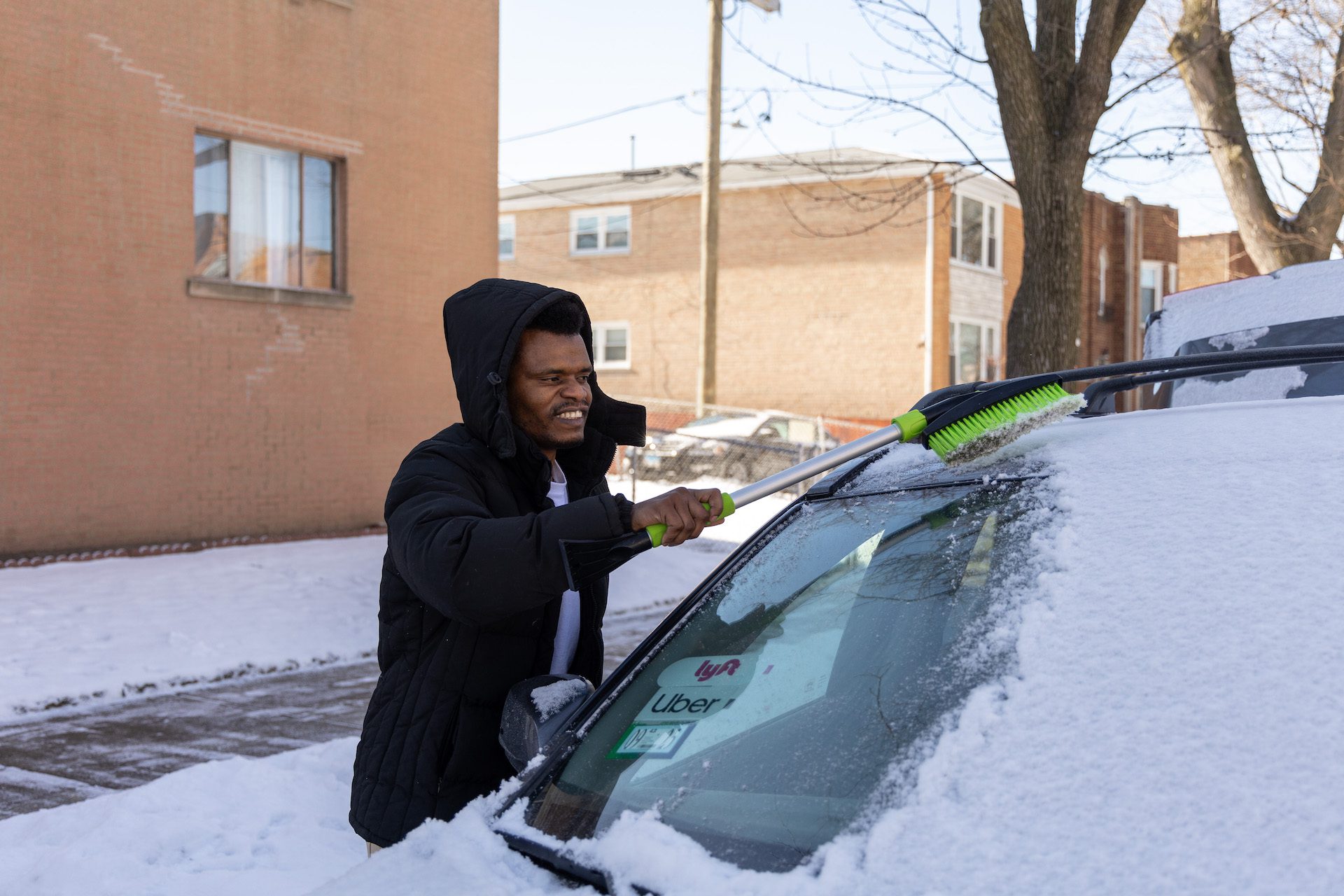
In November of that year, I started working as a community support specialist in RefugeeOne’s wellness department. I conduct mental health screenings with refugees as they transition from Africa to Chicago, enroll them in programs and process their mental and emotional feelings. I also help them adapt to life in Chicago and to U.S. culture. I show them community resources, like libraries and parks, and help them navigate public transit.
My ambition was always to do this kind of work. I’m proud of helping refugees. I’ve spent 21 years of my life as a refugee. I understand and share the same culture with some of them. I know how to approach them, how to help them and how to talk to them. I know how they feel.
I speak English, Kinyarwanda, Kinyamurege, Kirundi, Swahili, Shona and some French. Now, I am learning Spanish. I’ve been able to help clients because we speak the same languages, which made the process smoother for all of us. I sometimes translate for our therapists. I’ve heard from our therapist that clients have been more open to talking during screenings or therapy sessions when I am there. They feel comfortable because I understand their experience and can speak their languages.
I like that I help clients become self-sustaining. I’ve helped them get jobs. Recently, one of them invited me to their house to celebrate their new job. All those positive job referrals keep me moving.
I’m always thankful to RefugeeOne for giving me this opportunity to connect with my fellow refugees so that I can help them. It’s tough when you get here and don’t know anyone, especially someone who shares your culture or language.
I’m in the right place.
I Want To Help Kids In Zimbabwe
I live in Chicago with my sister and brother, and the rest of my family is within walking distance. I hang out with friends, go to concerts and play soccer. I keep in touch with my wife of two years, who is still in Zimbabwe. It has been stressful to be away from her for this long, but I have faith that we will reunite soon. RefugeeOne is helping me apply to get her to resettle in Chicago.
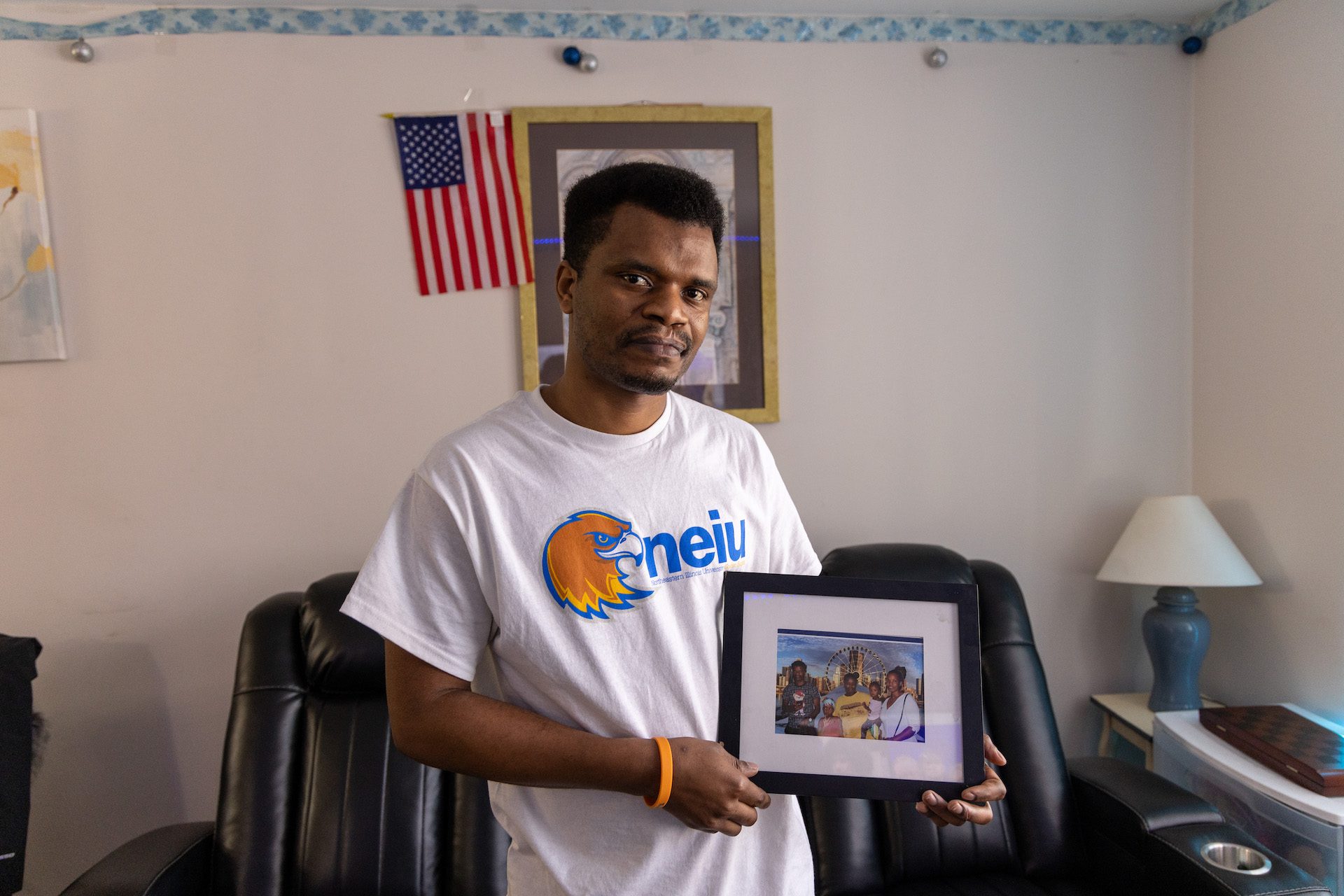
Last month, I began classes at Northeastern University to finish my degree in social work. I am super excited.
I understand the importance of education because it helped me get out of the refugee camp and find a job I’m excited about. I want to help other kids in Zimbabwe like me continue their education.
My goal is to build an organization that helps young kids, orphans and unaccompanied children go to high school. If I get funds — by God’s grace — I will set this up in Zimbabwe so people can sponsor children’s education where I was raised.
Aydali Campa is a Report for America corps member and covers environmental justice and immigrant communities for Borderless Magazine. Send her an email at [email protected].
